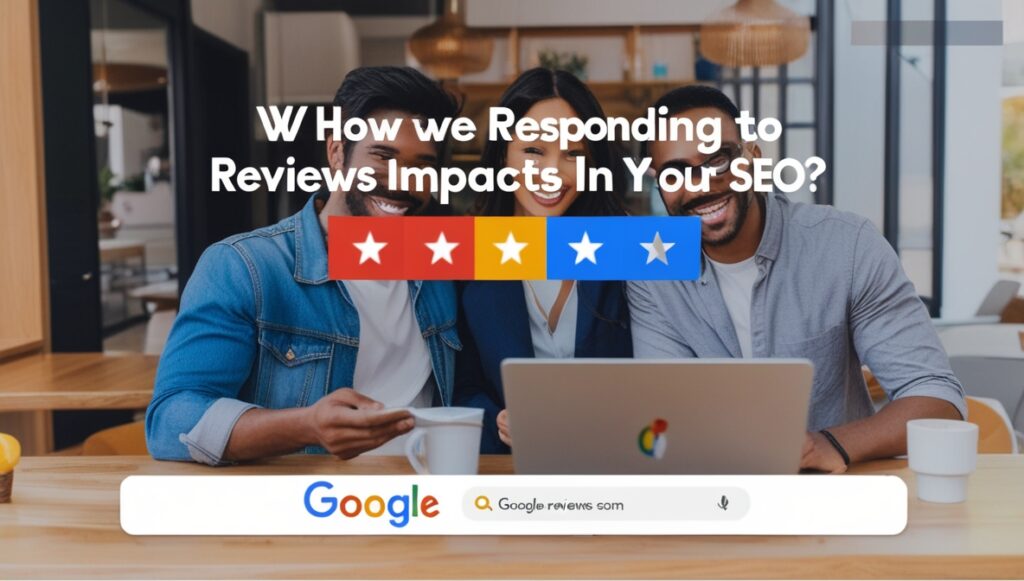
In the competitive world of digital marketing, businesses are constantly seeking ways to improve their online visibility. With Google being the most popular search engine, understanding how to rank higher in search results is critical to gaining more customers and growing your business. One strategy that has proven to be effective, yet often overlooked, is responding to Google reviews. So, does replying to Google reviews help SEO? The answer is: Yes, it does!
This article will explore how responding to Google reviews can help improve your SEO and discuss the key strategies to effectively leverage this tool. At Dust Digital Marketing Ltd., we aim to help businesses optimize their online presence, and Google reviews can play a significant role in achieving this.
Why Google Reviews Matter

Before delving into how responding to reviews impacts SEO, it’s important to understand why Google reviews matter in the first place. Google reviews are a form of social proof—feedback from real customers that reflects the quality of a business’s products or services. These reviews are visible on Google Search and Google Maps, making them highly influential in how potential customers perceive your business.
When a business has a steady stream of positive Google reviews, it gains credibility and trust from both users and search engines. Google uses these reviews as a ranking factor, especially in local search results. A higher volume of reviews, coupled with good ratings, sends positive signals to Google, which can help your business appear more prominently when users search for relevant terms. But what about responding to reviews? Does this simple act contribute to SEO?
How Responding to Google Reviews Impacts SEO
Responding to Google reviews can positively affect your SEO in several key ways:
1. Enhances User Engagement
Search engines like Google prioritize businesses that engage with their audience. When you respond to reviews, whether positive or negative, you’re signaling to Google that you’re actively involved in managing your online presence. This engagement improves the overall user experience, which Google rewards with better rankings. A business that values customer feedback and is willing to address concerns is seen as more trustworthy, thus improving its search visibility.
Moreover, when potential customers see that you take the time to reply to reviews, it increases their confidence in your business. They are more likely to engage with your business and leave reviews themselves, creating a cycle of positive feedback and engagement that can further boost your SEO efforts.
2. Increases Content on Your Google My Business Page
Each time you respond to a review, you’re adding fresh content to your Google My Business (GMB) listing. Google favors content that is relevant, fresh, and constantly updated. By regularly responding to reviews, you’re feeding the search engine with new information about your business. This additional content—especially when it includes keywords related to your business—helps Google better understand what your business is about, leading to improved search rankings.
For example, when you respond to a review, you can naturally incorporate keywords that you want to rank for. If someone mentions your product or service in a review, you can use those same terms in your reply. However, make sure your responses are genuine and not just stuffed with keywords. Google can detect unnatural keyword usage, which may harm rather than help your SEO.
3. Builds Trust and Reputation
Online reputation is a critical factor in SEO. Google’s algorithms are designed to reward trustworthy and credible businesses. By responding to reviews—whether they are positive, neutral, or negative—you’re demonstrating that you care about your customers and their feedback. This, in turn, builds trust with both customers and Google.
Responding to negative reviews is especially important. It shows potential customers that you are proactive in addressing issues and are committed to improving your services. Even a negative review, when handled professionally, can turn into an opportunity to showcase your customer service skills. Google recognizes this proactive behavior and can improve your ranking as a result.
4. Improves Local SEO
For businesses that rely on local customers, optimizing local SEO is crucial. Google reviews, along with responses, play a significant role in local search rankings. According to a study by Moz, review signals—such as review quantity, review velocity, and review diversity—account for 15.44% of how Google ranks local businesses. When you respond to reviews, you’re adding more signals that help Google determine your business’s relevance and authority in your local area.
Additionally, responding to reviews with local context can enhance your local SEO efforts. For instance, if a reviewer mentions a specific location or service area, you can acknowledge it in your response. This reinforces your connection to that location and improves your chances of appearing in local search results when users look for businesses in that area.
Can Responding to Reviews Help Improve Your SEO?

Put simply: Yes! Providing your reviewers with owner responses is an effective and cost-efficient way to rank better on Google, especially if you’ve fallen behind your competitors in local rankings. By engaging with customers, improving your GMB content, building trust, and boosting your local SEO, responding to Google reviews can have a tangible impact on your search engine performance.
Best Practices for Responding to Google Reviews
Now that we understand how replying to reviews benefits SEO, let’s explore some best practices for crafting effective review responses:
1. Respond Promptly
Timely responses show customers (and Google) that you are actively managing your online presence. Aim to respond to reviews within a few days, if not sooner. Quick responses signal that you value customer feedback and are dedicated to improving their experience.
2. Personalize Your Responses
Avoid using generic, copy-paste responses. Tailor your replies to the specific review, mentioning the customer’s name and details from their review. This not only makes the customer feel valued but also enhances the authenticity of your business in the eyes of future customers.
3. Be Professional and Courteous
Whether the review is positive or negative, always respond with professionalism. Avoid getting defensive or engaging in arguments with unhappy customers. Instead, offer solutions to any problems raised in negative reviews and thank customers for bringing the issue to your attention.
4. Incorporate Relevant Keywords
While responding to reviews, consider incorporating relevant keywords naturally into your responses. For example, if a customer mentions your “SEO services in Hong Kong,” you can respond by reaffirming how your “SEO services in Hong Kong are designed to help businesses grow.” However, avoid keyword stuffing. Keep the language natural and conversational.
5. Encourage More Reviews
In your response, consider encouraging satisfied customers to leave more reviews or share their positive experiences with others. This not only boosts your review count but also fosters more engagement, which benefits your SEO.
6. Respond to Negative Reviews Constructively
Negative reviews can be challenging, but they offer an opportunity to improve your reputation. Address the specific concerns raised in the review, apologize for any negative experiences, and offer to resolve the issue offline if necessary. This shows potential customers that you care about resolving problems, which builds trust and can lead to future positive reviews.
Case Study: How Responding to Reviews Helped a Local Business

Let’s take an example of a local restaurant in Hong Kong that struggled with poor local SEO rankings. Despite receiving numerous positive reviews, the restaurant was not responding to them, and its competitors were outperforming it in search rankings.
By implementing a strategy of promptly responding to all reviews—both positive and negative—the restaurant saw noticeable improvements in its local SEO. Within three months, its GMB listing became more engaging, with consistent responses to customer feedback. The business also incorporated relevant keywords related to its services and location in its replies, which helped it rank higher for local searches.
As a result, the restaurant’s search visibility improved by 25%, and it saw an increase in foot traffic and online orders.
Conclusion

In today’s digital landscape, SEO is essential for any business looking to succeed online. While many companies focus solely on traditional SEO tactics, such as optimizing website content and building backlinks, responding to Google reviews is an often-underutilized strategy that can yield significant SEO benefits.
So, does replying to Google reviews help SEO? Absolutely! By enhancing user engagement, adding fresh content to your GMB listing, building trust, and improving your local SEO, responding to reviews can help your business climb the search rankings. At Dust Digital Marketing Ltd., we encourage you to make this simple, cost-effective strategy part of your overall SEO plan. Not only will it improve your online visibility, but it will also foster stronger relationships with your customers.
Start responding to those reviews today and watch your SEO soar!

